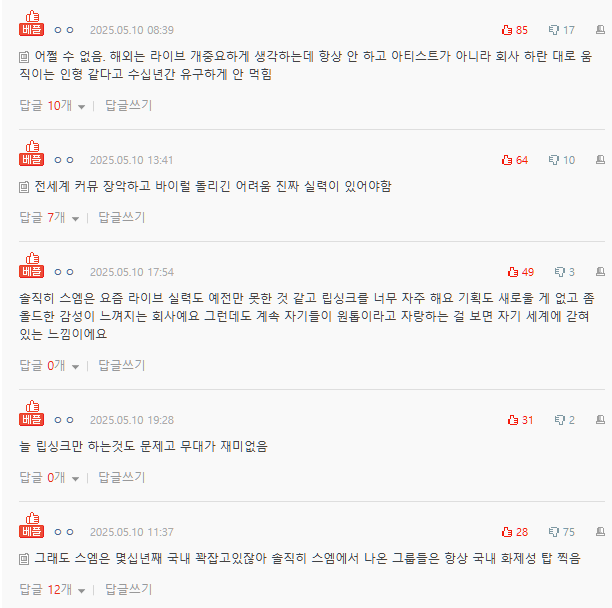SM Entertainment Faces Scrutiny Over Global Reach: “Do They Even Have International Fans Anymore?”
A recent post on Korean online forum Pann, titled “SM Really Has No International Fans Left, Huh,” is going viral, igniting strong reactions about SM Entertainment’s declining international traction. The post, which includes a direct comparison of YouTube subscriber counts among K-pop groups, questions SM’s current influence outside Korea.

Original Post Content
YouTube subscribers comparison:
- BLACKPINK: 96.5 million
- BABYMONSTER: 9.17 million
- TREASURE: 7.78 million
- Stray Kids: 20 million
- TWICE: 18.1 million
- ITZY: 9.53 million
- NMIXX: 3.37 million
- aespa: 7.18 million
- RIIZE: 1.74 million
- WISH: 820K
“What is this, it’s all pretty underwhelming. aespa’s doing well overseas, so I thought they’d at least be holding the line—didn’t expect it to be this low.
I only became a fan of SM artists last year.”
Many netizens pointed to a perceived decline in live vocal abilities, overuse of lip-syncing, and stagnant creative direction as reasons for the company’s waning international appeal. While some acknowledged SM’s continued strength in the domestic market, the overall sentiment leaned heavily critical, with fans calling for a reinvention of the company’s strategies.
Comments on Pann:

- “It’s inevitable. Overseas fans care a lot about live vocals, but SM idols rarely perform live. They just follow whatever the company tells them like puppets. That kind of image hasn’t worked for years.”
- “You can’t dominate global communities or go viral without real talent. It’s just hard without actual skills.”
- “Honestly, SM’s live skills aren’t what they used to be. They lip-sync way too much, and their concepts aren’t fresh anymore. The company feels stuck in the past. Yet they still brag like they’re the industry leader—it just feels like they’re trapped in their own bubble.”
- “They always lip-sync, and their stages just aren’t exciting.”
- “Still, let’s be real—SM has had a tight grip on the domestic market for decades. Their groups are always at the top of the buzz rankings in Korea.”
The post has reignited long-standing criticisms that SM, once seen as a creative powerhouse, has not evolved with the changing expectations of the global K-pop audience—especially around authenticity, performance quality, and engagement. As newer agencies produce idols with stronger live skills and fresher concepts, the pressure on SM to reinvent its strategy appears greater than ever.









